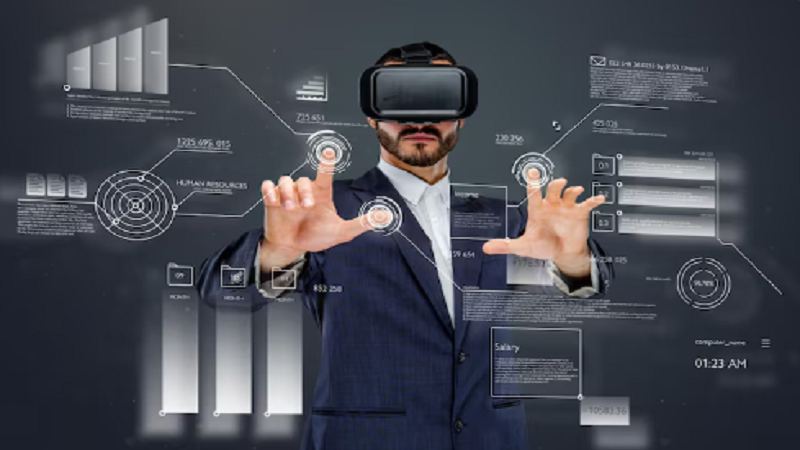In today’s fast-evolving world, digital transformation has become more than just a buzzword — it’s the foundation of how businesses operate, compete, and grow. As technology continues to advance at an unprecedented pace, companies across every industry are adapting to stay ahead. Understanding the innovative tech trends shaping the future of digital transformation is crucial for organizations aiming to thrive in this new digital era.
From artificial intelligence to blockchain, each innovation redefines efficiency, customer experience, and business strategy. Let’s explore the most influential tech trends that are reshaping the global digital landscape.
Artificial Intelligence (AI) and Machine Learning (ML): The Brains of Digital Evolution
No conversation about digital transformation is complete without mentioning Artificial Intelligence (AI) and Machine Learning (ML). These technologies enable machines to analyze massive amounts of data, recognize patterns, and make intelligent decisions with minimal human input.
AI is powering everything from voice assistants and predictive analytics to self-driving cars and personalized marketing. Machine Learning, on the other hand, allows systems to continuously learn and improve from data without explicit programming.
Businesses are using AI to automate repetitive tasks, enhance decision-making, and deliver personalized user experiences. For example, e-commerce companies leverage AI for product recommendations, while healthcare providers use it for early disease detection.
AI and ML are not just trends — they are the engines driving innovation, making them fundamental to the future of digital transformation.
Cloud Computing: The Backbone of Modern Business Operations
The rise of cloud computing has completely changed how organizations store, access, and manage their data. Instead of relying on physical servers, companies are now migrating to cloud-based platforms that offer flexibility, scalability, and cost efficiency.
Cloud services like Amazon Web Services (AWS), Google Cloud, and Microsoft Azure provide secure infrastructure for businesses to operate globally. Hybrid and multi-cloud models are becoming increasingly popular, allowing companies to optimize performance and minimize downtime.
In digital transformation, the cloud is the enabler that connects everything — from AI algorithms and IoT devices to big data analytics. It provides the agility that modern businesses need to innovate quickly and serve customers better.
The future of business innovation relies heavily on cloud technology, making it a critical component of digital transformation strategies worldwide.
Internet of Things (IoT): Connecting the Physical and Digital Worlds
The Internet of Things (IoT) bridges the gap between the digital and physical worlds. By connecting everyday objects — from appliances and vehicles to industrial machines — IoT enables real-time data exchange and automation.
Smart homes, wearable health trackers, and connected factories are just a few examples of IoT in action. For businesses, IoT offers valuable insights into customer behavior, operational efficiency, and predictive maintenance.
For instance, manufacturing companies use IoT sensors to monitor equipment health, reducing downtime and maintenance costs. In healthcare, IoT devices track patients’ vital signs remotely, improving treatment outcomes.
As connectivity improves with 5G networks, IoT adoption will skyrocket, fueling smarter cities, efficient logistics, and better environmental monitoring. This interconnected ecosystem is one of the most powerful tech trends shaping the future of digital transformation.
Blockchain Technology: Securing the Digital Future
Originally known for powering cryptocurrencies like Bitcoin, blockchain technology has evolved into one of the most trusted digital systems for security, transparency, and traceability.
Blockchain is a decentralized ledger that records transactions across multiple computers, making it nearly impossible to alter or hack. This technology has found applications in supply chain management, finance, real estate, and even healthcare.
For example, blockchain helps verify the authenticity of products, track shipments, and secure financial transactions. In digital transformation, it ensures trust among users, enabling businesses to operate transparently and securely.
As cyber threats continue to rise, blockchain will play a crucial role in protecting sensitive data and reinforcing digital trust — a foundation for future business innovation.
5G Connectivity: Powering the Next Wave of Innovation
The introduction of 5G technology marks a new era of hyper-connectivity. With faster speeds, lower latency, and greater capacity, 5G enables seamless data transfer between devices — fueling other technologies like IoT, AI, and cloud computing.
5G empowers real-time communication, making innovations like autonomous vehicles, smart cities, and advanced telemedicine possible. It also enhances remote work experiences and supports high-definition streaming, virtual collaboration, and cloud gaming.
For businesses, this means better productivity, improved customer interactions, and faster digital adoption. 5G is not just an upgrade from 4G — it’s the infrastructure supporting the future of digital transformation.
Edge Computing: Speed and Efficiency at the Source
As data volumes grow, traditional cloud models can’t always keep up with the need for speed. That’s where edge computing comes in. Instead of sending data to centralized cloud servers, edge computing processes it closer to the source — such as IoT devices or local data centers.
This reduces latency, improves efficiency, and enhances security. Industries like manufacturing, healthcare, and autonomous driving benefit from real-time data processing at the edge.
For example, autonomous vehicles rely on instant decision-making — something only edge computing can provide. Similarly, hospitals use edge systems for faster diagnostics and patient monitoring.
By enabling faster insights and responses, edge computing is a vital pillar of the innovative tech trends driving digital transformation.
Cybersecurity Innovations: Protecting the Digital Ecosystem
With digital growth comes digital risk. Cyberattacks, ransomware, and data breaches are becoming more frequent and sophisticated. Therefore, cybersecurity innovation is at the heart of every digital transformation strategy.
Modern solutions use AI-driven threat detection, zero-trust frameworks, and blockchain-based security systems to combat evolving threats. Multi-factor authentication, biometric verification, and encryption technologies are also being widely adopted.
Companies are prioritizing cybersecurity not just to protect their data but also to maintain consumer trust. In a world where data is the new currency, safeguarding it is essential to the sustainability of digital transformation efforts.
Automation and Robotics: Redefining Productivity
Automation and robotics are revolutionizing industries by handling repetitive, time-consuming tasks with precision and consistency. From robotic process automation (RPA) in offices to industrial robots in factories, automation enhances productivity and reduces human error.
Businesses are now adopting hyperautomation, where AI, ML, and RPA work together to automate complex workflows. This approach minimizes costs and allows employees to focus on creative and strategic activities.
For instance, logistics companies use autonomous drones for deliveries, while retailers use automated chatbots for 24/7 customer service.
Automation and robotics not only boost efficiency but also redefine the workforce of the future — a core aspect of digital transformation.
Augmented Reality (AR) and Virtual Reality (VR): Transforming Experiences
The boundaries between the digital and physical worlds are blurring thanks to AR and VR technologies. These immersive tools are changing how businesses interact with customers, train employees, and market products.
AR overlays digital information on the real world, while VR creates fully virtual environments. Together, they’re revolutionizing industries like education, healthcare, gaming, and real estate.
For example, AR allows furniture retailers to let customers visualize products in their homes before buying. In healthcare, VR is used for medical training and patient therapy.
These technologies offer personalized, engaging experiences that define the future of digital transformation in customer interaction and learning.
Big Data and Predictive Analytics: Powering Smart Decisions
Data is the lifeblood of digital transformation. However, it’s not just about collecting data — it’s about using it intelligently. Big data and predictive analytics enable businesses to uncover trends, forecast outcomes, and make informed decisions.
By analyzing data patterns, companies can predict customer preferences, market trends, and operational risks. For instance, predictive analytics helps financial institutions detect fraud and helps retailers optimize inventory.
When combined with AI, big data analytics becomes a game-changer, offering real-time insights that guide innovation and growth.
This data-driven decision-making is at the core of every successful digital transformation journey.
Sustainable Technology: Building a Greener Digital Future
Sustainability has become a major focus in the tech world. As businesses digitize, they’re also seeking eco-friendly solutions that reduce carbon footprints and conserve resources.
Technologies like green data centers, energy-efficient hardware, and AI-powered resource optimization are driving the shift toward sustainability. Cloud providers are also adopting renewable energy to power data operations.
Sustainable tech aligns with corporate social responsibility (CSR) goals while ensuring long-term business viability. It’s one of the most promising innovative tech trends shaping the future of digital transformation, balancing progress with environmental responsibility.
Conclusion: The Road Ahead for Digital Transformation
The world is entering an era where technology is not just supporting business — it’s defining it. From AI and IoT to blockchain and sustainability, these innovative tech trends shaping the future of digital transformation are revolutionizing how we live, work, and connect.
Organizations that embrace these advancements will not only stay competitive but also lead the charge toward a smarter, faster, and more sustainable digital future.
Digital transformation is no longer optional — it’s essential. The key is to adapt, innovate, and leverage technology strategically to create lasting value and drive global progress.Read More Futuretechgirls.

